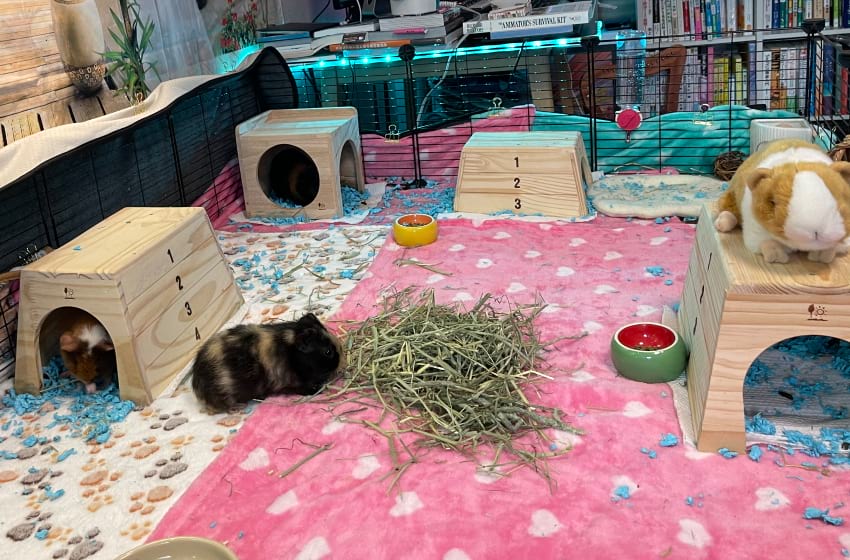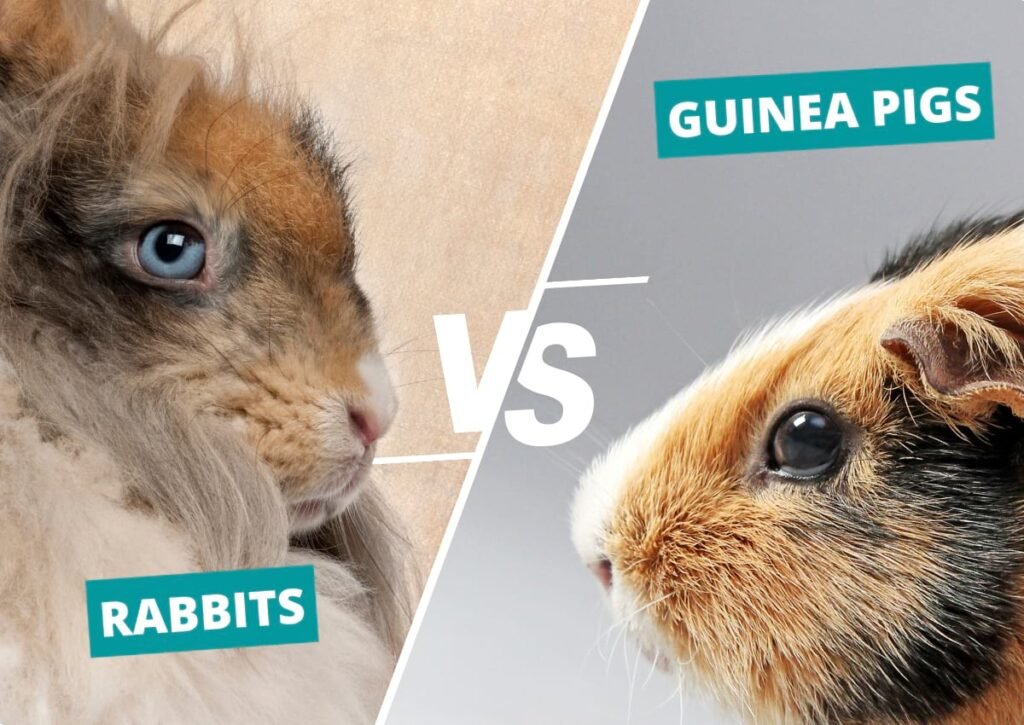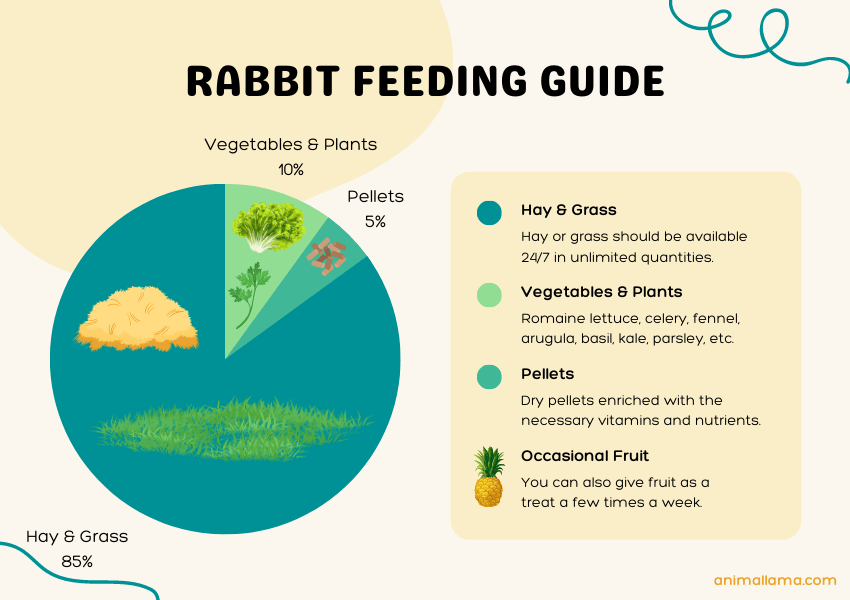Deciding on the perfect pet can be a challenging task. If you’re torn between getting a guinea pig or a rabbit, let me walk you through their similarities and differences.
Guinea pigs and rabbits are both social creatures that thrive on same-species companionship. While rabbits may be tougher to bond with and more destructive, they are cleaner pets. On the other hand, guinea pigs are easier to handle, require less space, but have shorter lifespans.
This article will delve into 16 key differences and similarities in caring for rabbits and guinea pigs.
1. Guinea Pigs and Rabbits Are Social Animals
Both guinea pigs and rabbits are social animals that thrive in the company of their own kind. It is crucial to keep them with other animals of the same species to meet their social needs adequately.
In rare cases, some guinea pigs or rabbits may struggle to bond even after multiple attempts. Guinea pigs should never be kept alone; solo guinea pigs should at least live in close proximity to another pair or group of guinea pigs to allow for social interaction without direct contact that may result in harm.
A similar setup can be created for rabbits, although it is less common, probably due to their need for more space.
2. It’s More Difficult to Bond Rabbits

Forming a bond between two animals is never a guarantee. This is particularly true for rabbits, as they are more challenging to bond compared to guinea pigs.
I always recommend first-time owners to adopt a bonded pair instead of attempting to bond animals themselves. However, at some point, you may still need to bond a single rabbit or guinea pig, so having knowledge on the topic is essential.
If there is a rescue or shelter nearby that offers “speed dating” for pets, take advantage of it! This allows you to introduce your guinea pig or rabbit to several potential companions until you find the perfect match.
Alternatively, especially with rabbits, it is advisable to start with fostering. This way, if the two animals do not get along and you cannot keep the new pet, no harm is done.
3. Rabbits Require More Space
Guinea pigs need larger cages than what pet stores typically recommend. The minimum cage size for two guinea pigs is 7.5 square feet, although many experts suggest that this space is insufficient. It is recommended to provide a cage of 10.5 square feet or larger.
Rabbits are not suited for living in cages. The smallest enclosure for a rabbit should be a large dog exercise pen, but ideally, they should have the freedom to roam in at least one room of the house.
4. It’s Harder to Rabbit-Proof Than to Guinea Pig-Proof
Before allowing your rabbit to roam freely, it is essential to rabbit-proof the area. Rabbits have a tendency to chew wires, dig at carpets, and gnaw on baseboards among other things.
Rabbit-proofing is similar to baby-proofing a house – you need to remove any potential hazards and items that the rabbit may chew on. To protect baseboards, you can use C&C grids.
While guinea pigs benefit from floor time outside their cage, they are not as destructive as rabbits. However, it is still important to tidy up the space, secure wires, and block access to hard-to-reach areas under furniture.
It is worth noting that guinea pigs tend to urinate and defecate in dark spaces, so if they are allowed under furniture, it may become their preferred spot for doing their business!
5. Rabbits Can Be Litter Trained More Effectively
While litter boxes can help in maintaining cleanliness in a guinea pig’s cage, rabbits can be litter trained similar to cats!
Before starting the litter training process, it is recommended to have your rabbits spayed or neutered. Some rabbits may require more time to learn than others, so starting in a confined space, such as a dog exercise pen, and gradually increasing their space can aid in successful litter training.
6. Both Animals Require Daily Cleaning

Guinea pigs are generally messier than rabbits, although it can vary depending on the individual animals. If your rabbit is not litter trained, they are likely to create a larger mess since they have more space to move around.
Regardless of the pet, you will need to clean up feces and urine daily, whether in a litter box or within the cage. Additionally, hay tends to scatter everywhere, and rabbits have a tendency to shred items, so expect to clean up shredded cardboard or similar materials regularly.
7. Rabbits Cannot Be Bathed
Both rabbits and guinea pigs are self-cleaning animals and seldom require bathing. Guinea pigs may need a bath a few times a year at most, while some may never need one at all.
It is important to note that rabbits should never be bathed as it can be harmful to their health. Wetting a rabbit can disrupt their body temperature regulation and potentially lead to shock, which can be fatal.
8. Guinea Pigs Are Easier to Pick Up
Most rabbits do not enjoy being held and cuddled, while guinea pigs are generally more tolerant of being picked up. While neither animal particularly loves handling, guinea pigs are often more relaxed when being held and can sit comfortably in your lap.
Both guinea pigs and rabbits have sensitive spines, so it is important to handle them carefully and avoid any accidental falls.
9. Their Diets Are Similar, but Not the Same
Both rabbits and guinea pigs are herbivores, meaning their diet consists of plants. They have fast digestive systems, requiring them to eat constantly to maintain a healthy gut.
The majority of their diet should comprise grass hay, such as timothy hay or orchard grass. They should also be given a mix of dark, leafy greens daily and a small portion of quality guinea pig or rabbit pellets.
It is important to note that the daily herbs and vegetables they consume may vary between rabbits and guinea pigs. Therefore, it is essential to research and understand their specific dietary requirements. Never feed guinea pig pellets to a rabbit or vice versa, as their nutritional needs differ.
10. Guinea Pigs Can’t Produce Their Own Vitamin C
Guinea pigs, like humans, lack the ability to produce their own vitamin C. Without an adequate intake of vitamin C, they can develop scurvy. To supplement their vitamin C levels, feeding them dark, leafy greens and bell peppers is recommended.
While vitamin C is not harmful to rabbits, they produce their own and require less of it in their diet compared to guinea pigs.
11. Guinea Pigs Have Shorter Lifespans
The average lifespan of a guinea pig is 5-7 years, whereas rabbits can live between 8-12 years. Before adopting a pet, it is crucial to consider their lifespan and ensure that you can commit to caring for them throughout their entire life.
It is also essential to plan for providing your guinea pig or rabbit with a same-species companion for their entire lifespan. Many pets are left alone in their later years because their owners do not wish to continue the cycle of pet ownership, which is unfair to the animals. Fostering can be a great way to provide a senior pet with companionship without the long-term commitment of adoption.
12. Both Require Regular At-Home Health Checks and Exotic Vet Visits

Both rabbits and guinea pigs are prey animals that are adept at concealing signs of illness. It is important to monitor them regularly, conduct weigh-ins, and inspect their bodies for any signs of illness, such as runny noses, overgrown teeth, or hair loss.
If your rabbit or guinea pig stops eating or defecating, it is an emergency that necessitates an immediate visit to the vet.
Regular visits to an exotic pet veterinarian, not a conventional dog and cat vet, are essential. During their youth, they should visit the vet at least once a year, increasing to once every six months as they age. Prompt veterinary care is crucial if you notice any signs of illness.



